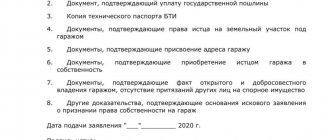Often, citizens who own land plots believe that since the plot is in their ownership, it means they can build any real estate on it. However, this is not at all true. In this article we will examine in detail the question of what such a judgment can lead to and how its negative consequences can be prevented. So, you own a plot of land on which you want to build, for example, a residential building. According to the law, every citizen must notify the local government about such intentions before starting construction, and upon completion, notify the same administration about the completion of construction, attaching a technical plan for the constructed facility. This is a moment you can't miss. It is necessary to build real estate and notify government authorities so that the construction is not recognized as unauthorized construction.
According to the Civil Code of the Russian Federation, art. 222, not only real estate that was built in the absence of building permits, but also a building erected in violation of town planning and building codes will be considered an unauthorized construction. If the property is recognized as a self-construction, it will not be registered in the cadastral register and the ownership of it will not be registered.
Is recovery possible?
To register property you will need the following documents:
- for house and land: technical passport, cadastral passport, plan;
- identification;
- title-establishing: purchase and sale agreement, on allocation for use on the basis of a warrant, on transfer through privatization.
Photo: Daniel Frank/pexels.com
Often the latest papers are missing: they are lost, have become unusable, were not received by the owner of the property (for example, an heir), etc.
When a potential owner does not have the necessary documents for real estate, he must choose the appropriate option for obtaining them.
Initially, they contact the local administration. If a plot of land for a house was allocated a long time ago (for example, in Soviet times), copies of the relevant decisions and entries in the household register may remain.
Screenshot of an application to the administration using the example of Seleevsky rural settlement
As a rule, such materials are sent to the archives after a long time. Therefore, the interested person requests to issue a certificate with the remaining information about a specific house.
Attention! Previously, there was no centralized automated database for real estate; materials were stored on paper. They were not insured against fire, floods, or theft, which sometimes led to their loss.
Photo: Pixabay/pexels.com
Example . In order to bequeath the property to her only daughter, Ulyana Andreevna decided to properly register the property - a house in the village. Since some of the papers were lost, she went to the village council and submitted an application. As a result, an extract from the household register and a certified copy of the decision were issued that in 1978 she was allocated a plot of land in the village for the construction of housing and farming.
Another department worth visiting is the BTI (until 1998, after the function was transferred to Rosreestr). If information is available, specialists will provide a certificate of registration of the property and available copies.
When a home was purchased (donated, inherited) and this fact was certified by a notary, an application is submitted to him or to the archives of the notary chamber of the subject of the Russian Federation where he carried out activities.
Acceptance certificate
The act is issued only with the consent of all members of the commission to put the house into operation. If the commission disagrees, a conclusion is drawn up, according to which the identified inconsistencies must be corrected within a specified period. After correcting all the shortcomings, the procedure for calling the commission is repeated. The final decision must be signed by the head of the architectural committee or his deputy.
This document includes the following information:
- List of commission members who inspected the house;
- Date and place of reception (place – location of the house);
- The nature of the registered object;
- Structure of the property.
Simplified registration
If a person received a plot before October 30, 2001 (before the Land Code came into force) for personal farming, for construction or a dacha, then he has the right to become an owner in a simplified form - under a dacha amnesty. To do this you must submit:
- identification;
- technical plan;
- document on the provision of land (act, decision).
Example . In 1983, Stepan Petrovich, based on a resolution of the local Council of Deputies, was allocated a plot of land for a dacha. Having documents in hand, he applied to Rosreestr to become the legal owner of the house. As a result, he received an extract from the register of rights to real estate.
Photo: John Lambeth/pexels.com
Attention! In this way, an object on land allocated for individual construction or located on the territory of a settlement and intended for subsidiary farming can be registered until March 1, 2021 (Article 5 of Federal Law No. 267 of 08/02/2019).
Screenshot of the application form for state cadastral registration of real estate in Rosreestr
Commissioning
After registration, the house began to exist legally. Next, it is necessary to put it into operation, in accordance with all the nuances regulated by Federal Law No. 122 of July 21, 1997.
List of documentation required to carry out this procedure:
- extract from the Unified State Register of Real Estate;
- permission issued by local self-government authorities for the construction of real estate;
- house project, its plan.
Having collected all the above documentation, you must contact the territorial administration (or municipal) to call the admissions committee. On the day set by the commission, she arrives, carries out an inspection, checks the documentation you have collected and draws up an acceptance certificate.
Acquisitive prescription
When a citizen continuously, conscientiously and openly owns someone else’s house for 15 years, he has the right under Art. 234 of the Civil Code to become its owner.
This procedure is carried out by filing a claim in court. The plaintiff can confirm the fact of ownership and use with witness statements, certificates from the village council, receipts (for example, that he carried out repairs and paid for utilities).
Screenshot of an example claim from the site iskiplus.ru
If the decision is positive, the plaintiff submits it along with an application and a document confirming payment of the state duty to the registration authorities.
Material on topic! The procedure for registering a garage as property.
Through the court
There are situations when none of the options discussed above are applicable. Then the last option remains - going to court.
For example, a person purchased a house in a village without proper registration and only paid for it. Moreover, there were initially no papers for the property. In this case, a claim is filed to recognize the ownership rights of the original owner (the one from whom the house was bought). And then there are two options:
- contract of sale;
- donation.
In this case, it is important to act together with the previous owner of the home.
Timing and cost
It is impossible to predict exactly how much time and money will be spent on registering a house in a rural area without documents. It depends on the conditions and method of obtaining the right (when it was possible to find title papers or when it was necessary to prove the fact of ownership in court).
Photo: Pixabay/pexels.com
In any case, you will have to pay a state fee (for registering real estate or considering the case in court). It also plays a role whether the applicant himself draws up the paperwork for the house or whether he turns to the paid services of lawyers (real estate agencies).
For example, for registering a house using a simplified form, a state fee of 350 rubles is provided. (clause 24 of article 333.33 of the Tax Code of the Russian Federation).
When preparing documents independently, a person will incur costs:
- land surveying - from 2,000 to 15,000 rubles, depending on the region;
- BTI services - about 3,000 rubles;
- State duty – from 350 rubles.
If the work is carried out by a representative, then a fee for a power of attorney is added (about 1,000 - 1,500 rubles), the price consists of the state duty under Art. 333.24 Tax Code (200 rubles) and technical services. If a citizen turns to an agency, he pays additionally for its work - on average from 30,000 to 80,000 rubles.
Author: Anna Nikolaevna, Lawyer. February 21, 2021.
Who can be the heir?
In the Russian Federation, there are two options for inheritance - by will or by law. The first option takes precedence if the will is drawn up correctly. In this case, the will of the deceased is executed, who independently distributes real estate and other property.
But there are categories that receive a share in the inheritance regardless of the presence of a will:
- Imperfect or incompetent children.
- Incapacitated spouse.
- Incompetent parents.
- Dependents of the testator who lived with him for at least 1 year.
If there is no will or it is declared invalid, the procedure of inheritance by law is used.
Chapter 63 of the Civil Code of the Russian Federation determines the order of inheritance:
| 1st stage | Spouse, children and parents |
| 2nd stage | Grandparents, brothers and sisters |
| 3rd stage | Uncles and aunts |
| 4th stage | Great-grandparents |
| 5th stage | Great-grandparents, cousins, grandsons and granddaughters |
| 6th stage | Cousins and nieces, great uncles and aunts |
| 7th stage | Stepfather, stepmother, stepsons and stepdaughters |
| 8th stage | Dependents |
There is also inheritance by right of representation. It is used when, after the opening of the inheritance, one of the heirs of the called line dies. Then his closest relatives will inherit instead. If one of the applicants refuses the property, its part is distributed among the heirs in his turn.
Note! It is important to contact the notary in charge of the case within 6 months after the death of the testator. Otherwise, only the court can restore the term. But this requires good reasons.
How to recognize the right to a house?
First of all, you need to go to court with a well-drafted claim and applications. It must clearly and consistently reflect the situation as the plaintiff sees it. At the end of the statement, demands for recognition of ownership are made. The claim must be accompanied by documents that confirm the correctness of the position.
The claim is sent to the district court to which the house belongs. To determine the exact address, you can contact the court reception or look at the address in the jurisdiction section on the court’s website. The application can be submitted directly to the judge or through the office.
Important! The entire package of documents must be submitted in at least 3 copies. A copy is prepared for the plaintiff, the defendant and the court. If there are several defendants, it is necessary to prepare a set of documents for each of them.
When filing a claim, your copy will be stamped with an entry number and a signature on the receipt. Next, the court sets a date for the first hearing (conversation). You can find it on the court’s website or call the judge’s office or reception office. Notification is sent to all participants, but it does not always arrive on time.
Collection of evidence
The judge cannot objectively consider your claims until he receives a complete evidence base that reflects the picture of what happened. If documents are missing, it is important to prove that you could not obtain or restore them earlier. If illegal actions are taken by officials, the application is submitted to the arbitration court. This must be done within 3 months after the violation is detected. If the deadline is missed, the court can restore it. But this requires compelling reasons and a separate petition.
After recognition of ownership in court, you can register ownership and receive the corresponding extract from the Unified State Register of Real Estate. To do this, you need to wait until the court decision comes into force and the writ of execution is ready.










